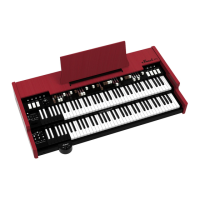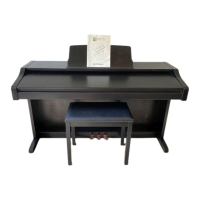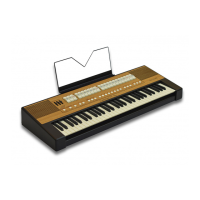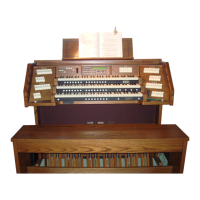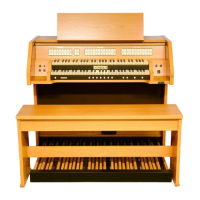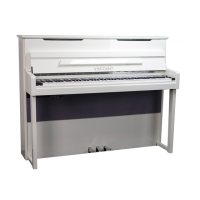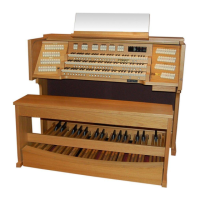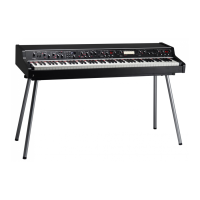
Do you have a question about the Viscount Legend ‘70s Artist-W and is the answer not in the manual?
| Brand | Viscount |
|---|---|
| Model | Legend ‘70s Artist-W |
| Category | Musical Instrument |
| Language | English |
Essential instructions for safe operation, covering fire, electric shock, and personal injury risks.
Guidelines on handling, cleaning, and maintaining the instrument to prevent damage.
Explains the manual's purpose, contents, and manufacturer's rights regarding updates.
Highlights the instrument's vintage design, modularity, sound quality, and connectivity.
Details the main section and available modules on the front panel layout.
Explains the function of the pitch bend and modulation wheels located on the left of the keyboard.
Location and usage of the 1/4" jack connector for headphones.
Step-by-step procedure for physically installing additional sound modules into the instrument.
Describes controls for master volume, equalizer, reverb, and effects sections on the main panel.
Details controls for managing and adjusting the two independent effect processors (FX1, FX2).
Explains controls for program selection, saving, song mode, and split function.
Describes shared controls (On/Off, Volume, Status LEDs) present on all modules.
Details the parameters and functions for the electric piano sound module.
Explains the settings and controls for the acoustic piano sound module.
Details the parameters and functions specific to the Clavinet sound module.
Covers controls for selecting and adjusting various sound categories and instruments.
Explains how to control external MIDI devices using the instrument's master keyboard functions.
Describes all audio input and output jacks, including main and auxiliary connections.
Details the connectors for sustain, foot switch, foot controller pedals, and MIDI IN/OUT.
Explains the USB TO HOST, USB TO DEVICE ports, and the power input connector.
Provides the correct procedure for turning the instrument on and off safely.
Guides on connecting the instrument to external speakers, amplifiers, or headphones.
Instructions for connecting the instrument to an audio mixer for recording or live performance.
Details how to connect to other MIDI devices using MIDI cables for data exchange.
Explains how to use the instrument's keyboard to control external sound sources via MIDI.
Describes connecting the instrument to a computer for DAW use, recording, and playback.
Explains the types of pedals supported and how to connect them to various pedal jacks.
Guide on selecting and activating sounds from the installed modules.
Overview of the instrument's effects section, including reverb and 3-band equalizer.
Steps for activating, selecting, and assigning modules to effects FX1 and FX2.
Procedure for activating, selecting, and adjusting the reverb effect parameters.
Explains the components of a Program, including location, name, and active modules.
Details methods for selecting programs using panel controls, data dial, or footswitch.
Instructions on how to save modified programs, assign names, and select storage locations.
Covers general program parameters like Split Mode, Split Point, and pedal assignments.
Explains how to assign modules to specific keyboard zones or split sections.
Details parameters for effects like Tremolo, Vibrato, Chorus, Flanger, and Phaser.
Covers reverb types and adjustable parameters like Time, High Damp, and EQ.
Explains parameters for the E.PIANO module, including timbre, volume, and effects.
Details settings for the A.PIANO module, focusing on timbre, dynamic range, and brilliance.
Covers parameters for the CLAVI module, including filters, pickup configuration, and mute.
Explains controls for sound categories, timbres, and main sound generation parameters.
Details parameters for controlling external MIDI devices, including port, channel, and CC assignments.
Explains how songs are composed of programs and how to select them.
Instructions for permanently saving songs, including naming and location selection.
Describes how to assign programs to the individual parts within a song.
Details how to reorder songs within a list or add/delete songs.
Explains how to copy songs or entire lists to different locations or lists.
Allows selection and management of song lists.
Covers parameters like Transpose, Fine Tuning, and Velocity Curves.
Details general equalizer settings and MIDI interface configurations.
Explains pedal configuration and instrument customization options.
Helps identify the installed modules and their positions in the instrument.
Procedures for backing up, restoring, and resetting instrument data and settings.
Guides on checking and updating the instrument's operating system and individual modules.
Lists shortcuts and button combinations for quick access to functions without menus.
Explains common error messages and potential solutions or troubleshooting steps.
Provides solutions for common issues like no sound, distortion, or connection problems.
A comprehensive list of available sounds within the Sound Collection module.
Explains MIDI protocol, connectors, and the use of MIDI channels for communication.
Details common MIDI messages like Note On/Off, Control Change, and Program Change.
A technical chart detailing MIDI messages transmitted and received by the instrument.
